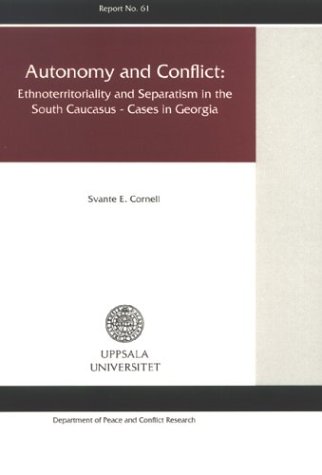Items related to Autonomy & Conflict: Ethnoterritoriality &...
Autonomy & Conflict: Ethnoterritoriality & Separatism in the South Caucasus - Cases in Georgia (Uppsala University Department of Peace & Conflict Research, Report No. 61) - Softcover

Providing minority populations with autonomy is gaining appreciation as a method of solving, managing, and even pre-empting ethnic conflict. However, in spite of the enthusiasm for autonomy solutions among academics and practitioners alike, there is reason to argue that the provision of autonomy for a minority may under certain circumstances increase rather than decrease the likelihood of conflict. In certain political conditions, autonomy strengthens the separate identity of a minority; it thereby increases its incentives to collective action against the state; and most of all its capacity to seek separation from the central state, through the state-like institutions that autonomy entails. The objective of this dissertation is to investigate whether territorial autonomy was a contributing factor to the violent ethnic conflicts that have erupted in the South Caucasus since the late 1980s. It presents a theoretical argument to explain which qualities of autonomy solutions increase the likelihood of conflict; and then seeks to outline possible rival explanations derived from the theoretical literature. The dissertation then examines the explanatory value of any of the factors under study, it then moves on to study in depth the five minorities existing on the territory of the republic of Georgia. Three of them, Abkhazia, Ajaria, and South Ossetia, were autonomous, whereas two had no autonomous status. The dissertation shows how the institution of autonomy, by promoting an ethnic elite in control of state-like institutions, and by enhancing factors such as leadership, economic viability, and external support, played a crucial together with these factors in the escalation to conflict in Abkhazia and South Ossetia, whereas the absence of autonomy mitigated conflict in Javaheti, and other populations.
"synopsis" may belong to another edition of this title.
- PublisherUppsala Universitet
- Publication date2002
- ISBN 10 9150616005
- ISBN 13 9789150616002
- BindingPaperback
- Number of pages248
(No Available Copies)
Search Books: Create a WantIf you know the book but cannot find it on AbeBooks, we can automatically search for it on your behalf as new inventory is added. If it is added to AbeBooks by one of our member booksellers, we will notify you!
Create a Want